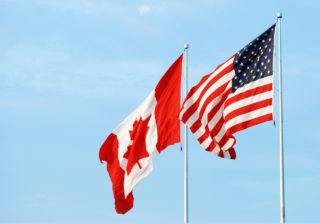
17 Oct Canada Cannabis Legalization Today: U.S. Customs and Border Protection Update
 U.S. border policy on Canadians and marijuana is tough.
U.S. border policy on Canadians and marijuana is tough.
On the eve of the Canada’s cannabis legalization, the U.S. Customs and Border Protection (“CBP”) held a teleconference to explain the agency’s enforcement policy and field questions from journalists.
The on-the-record teleconference featured the head of the CBP’s Office of Field Operations, which has a staff of 28,000+ employees and an operating budget of $5.2 billion to oversee the agency’s operations at 328 ports of entry and air preclearance locations worldwide.
CBP officials confirmed that U.S. government policy remains unchanged in the face of cannabis legalization in Canada: past use of, and any affiliation with, cannabis is grounds for getting a lifetime ban from entering the U.S. without a waiver, as explained in a previous post.
The key takeaways from the teleconference are as follows:
- Possession: Individuals attempting to cross the Canadian-U.S. border while possessing marijuana are subject to arrest and prosecution. If prosecution is deferred, the individual is potentially subject to a fine of $5,000.
- Amnesty or Pardon for Past Use: U.S. law will not recognize any amnesty or pardon by Canadian authorities for cannabis-related convictions. Admitting to a CBP officer that you used marijuana any time before legalization is the equivalent of a formal court conviction for that crime and you will likely be denied entry into the United States.
- Cannabis Industry Workers: Those who legally work in the Canadian cannabis industry must provide details about their role and convince U.S. border officers that their trip to the U.S. is purely personal. Cannabis workers will likely need to prove that while in the U.S., they will not engage in any networking or strategic meetings, presentations, marketing efforts, or any manufacturing or distribution activities with customers or cannabis industry colleagues.
- Cannabis Investors: Investors who knowingly financed and furthered the growth of the cannabis industry will almost certainly be denied U.S. entry and they risk a lifetime ban. Exceptions to this rule may be made for individuals whose mutual fund investment portfolio happens to have, without their knowledge, some stock in cannabis companies.
There appears to be some latitude at the border for occasional users of marijuana who start using marijuana post-legalization, and can demonstrate to the CBP officer’s satisfaction that they will not consume marijuana while in the U.S., even in states that have legalized it. Testing this theory, however, is for the brave who will put their hand in the crocodile’s mouth after being told that the crocodile does not bite.


Sorry, the comment form is closed at this time.